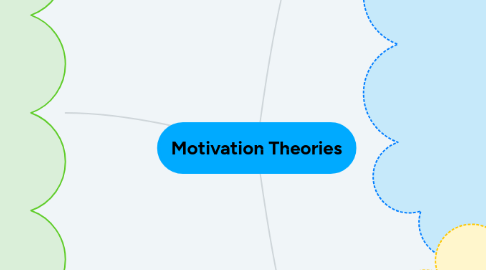
1. Other Theories
1.1. Self-Efficacy Theory Social cognitive or Social learning
1.1.1. Enactive mastery
1.1.1.1. gain experience
1.1.2. Vicarious modeling
1.1.2.1. see someone else do the task
1.1.3. Verbal persuasion
1.1.3.1. someone convinces you that you have the skills
1.1.4. Arousal
1.1.4.1. get energized
1.2. Reinforcement Theory
1.2.1. Operant conditioning theory
1.2.1.1. Behaviorism
1.2.2. Social-learning theory
1.2.2.1. Attentional processes
1.2.2.2. Retention processes
1.2.2.3. Motor reproduction processes
1.2.2.4. Reinforcement processes
1.3. Equity Theory / Organizational Justice
1.3.1. Employees who perceive inequity will make 6 choices
1.3.1.1. Change their inputs
1.3.1.2. Change their outcomes
1.3.1.3. Distort perceptions of self
1.3.1.4. Distort perceptions of others
1.3.1.5. Choose a different referent
1.3.1.6. Leave the field
1.3.2. Organizational Justice
1.3.2.1. Distributive justice
1.3.2.2. Procedural Justice
1.3.2.3. Interactional Justice
1.3.2.3.1. Informational justice
1.3.2.3.2. Interpersonal justice
1.4. Expectancy Theory
1.4.1. Three key relationship (employee who motivated to exert a high level of effort he believes)
1.4.1.1. Effort-performance relationship
1.4.1.1.1. Effort will lead to a good performance
1.4.1.2. Performance-reward relationship
1.4.1.2.1. Good appraisal will lead to organizational rewards
1.4.1.3. Rewards-personal goals relationship
1.4.1.3.1. Rewards will satisfy his personal goals
2. Early Theories
2.1. Hierarchy of Needs Abraham Maslow
2.1.1. Physilogical
2.1.2. Safety
2.1.3. Social
2.1.4. Esteem
2.1.5. Self-actualization
2.2. Two-Factors Theory (Motivation-hygiene Theory) Frederick Herzberg
2.2.1. Job Dissatisfaction
2.2.1.1. (Extrinsic) Hygiene Factors
2.2.1.1.1. Working conditions
2.2.1.1.2. Co-worker relations
2.2.1.1.3. Policies and rules
2.2.1.1.4. Pay
2.2.1.1.5. Quality of supervision
2.2.2. Job Satisfaction
2.2.2.1. (Intrinsic) Motivational Factors
2.2.2.1.1. Achievement
2.2.2.1.2. Recognition
2.2.2.1.3. Responsibility
2.2.2.1.4. Work itself
2.2.2.1.5. Advancement
2.2.2.1.6. Personal Growth
2.3. Theory of Needs McClelland
2.3.1. Need for achievement (nAch)
2.3.1.1. US cultural characteristic
2.3.1.1.1. willingness to accept modern risk
2.3.1.1.2. concern with performance
2.3.1.2. Higher achievers prefer jobs with
2.3.1.2.1. Personal responsibility
2.3.1.2.2. Feedback
2.3.1.2.3. Intermediate degree of risk 50/50
2.3.2. Need for power (nPow)
2.3.3. Need for affiliation (nAfl)
3. Contemporary Theories
3.1. Self-Determination Theory
3.1.1. Cognitive evaluation theory
3.1.2. Self-concordance
3.2. Goal-Setting Theory Edwin Locke
3.2.1. Goals Increase Performance
3.2.1.1. Specific
3.2.1.2. Difficult
3.2.1.3. Accompanied by feedback
3.2.2. Contingencies in goal-setting theory
3.2.2.1. Goal commitment
3.2.2.2. Task characteristics
3.2.2.3. National culture
3.2.3. People thoughts and behaviors categories
3.2.3.1. Promotion focus
3.2.3.2. Prevention focus
3.2.4. Management by Objective MBO (goals are tangible, verifiable, measurable)
3.2.4.1. Goal specificity
3.2.4.2. Participation in decision making
3.2.4.3. Performance feedback
3.2.4.4. Explicit time period

